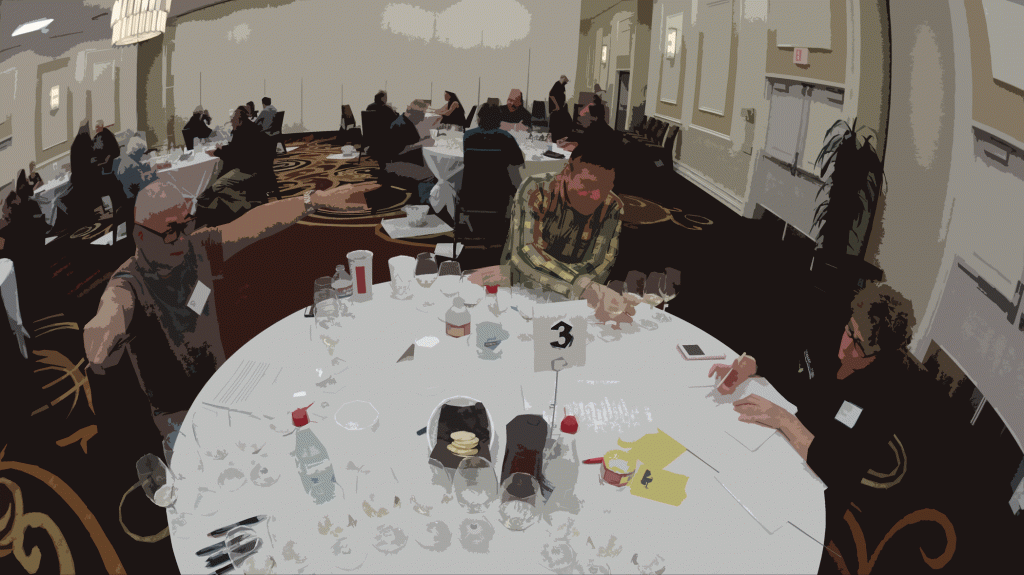The Frightening Truth About Wine Competitions
What really goes on behind the scenes at a wine competition? Who are these people who taste wines and whose opinions get plastered all over the front of a bottle with a medal and score? Are they there to take out their aggression and pamper their egos so they feel superior to all other wine drinkers? Do they really know what they are doing? How do they go about judging so many wines and why does their opinion really matter? Is it really fair to give an award to a wine just because one person prefers it over another? Here is the frightening truth about wine competitions.
I just finished judging the 32nd annual San Diego International Wine Competition. The SDIWC is the child of the grand papa of wine competitions in San Diego, Robert Whitley. I spent the weekend with fellow judges judging 1000 wines on Saturday and another 500 on Sunday. I got up close and personal. I infiltrated the competition and posed as a judge to bring you the truth about wine competitions. The truth is… they are a lot of fun!
Let’s answer the questions posed. First of all, who are these people? The SDIWC had judges from all walks of life within the wine world. There were winemakers like Vernon Kindred from Fallbrook Winery, Carlo Trinchero from Taken Wine Co. and Adam LaZarre from Lazarre Wines. Their were wine personalities & wine writers (story tellers) like Tim McDonald from Wine Spoken Here and Wilfred Wong from Wine.com. There were judges representing wine distribution companies such as Mark Deegan and Kevin Walsh. And there were sommeliers, the Motley “Cru” I run with like Brian Donegan, Paul Kirkorian, Tami Wong, Lisa Redwine, Molly Brooks-Thorton and Rebecca Turpin. So many more to mention, but the ring leaders were Robert Whitley, Rich Cook and chief judge Michael Franz, the editor of Wine Review Online who kept all of us hooligans in line. These are the people who get the last say. Their taste preferences are marked on bottle in the form of numbers, oval medals and gold stickers. I can’t speak for their egos, but they are all pretty damn cool.
Do they know what they are doing? Well that is a loaded question. Half the time I don’t think they know what they are doing. But when it comes to wine, they know exactly what they are doing. I can’t say that I would like drive behind Joe Hart, winemaker for Hart Family Winery. Or for that matter, I don’t think I would like to take any psychological advice from Ron Rawlson, but I do want to know what they think about wine. So yes, they know what they are doing. Let me clarify, they know what they are doing when it comes to judging wine.
How do they go about judging so many wines? The answer is “very carefully”. Most people think that if you drink so many wines you get drunk or even worse palate fatigue. This is why they are the chosen judges. They learned to spit, all except for George Skorka, but he seems to exist on another plane from most humans. (Those that know him will tell you that he is Buddhist-like, Christ-like and cannot get drunk.) Yes the palate can get fatigued, but a bit of sparkling water, a cracker or roast beef and they are back in the saddle again.
Why does their opinion even matter? Oh it matters! These judges will sacrifice their entire weekend tasting hundreds of bad wines to get to the few good ones. That is die-hard. I respect the opinion of someone who will go through the torture of tasting a flight of medium dry red blends from unknown parts of the world just to get to that one stand out. It is easy to judge Barolos and $100 Cabernets, but to have to judge fruit wines from the latest genetically modified fruit, that is a true professional. It’s like confiding in the Lexus car sales rep who drives a Lexus. I would rather confide in the sales rep that sells Lexus and drives a Kia. That rep would have a better point of reference as to why Lexus is worth the price. That is who these judges are. They taste the hundreds of pink to bright fuchsia colored wines to get to the Barolos. At home they drink good wine at a good value.
Is it fair to give an award to a wine just because one judge thinks it deserves that award? Nope. That is why at the SDIWC the judges have to come together and agree on the award. It takes time to get everyone to agree, and can be tricky because egos can get bruised. The solution was to leave the egos at the door so that the wines received the proper award. I had the pleasure of judging with Wilfred Wong and George Skorka. Remember I told you that George was from another plane? Well he is. When he tastes a wine that has funk on the nose, he literally drools and tries to push us into adoring it. However, the moment we tell George the wine might be off and to come back down to Earth, he obeys and his Christ-like ego says “thank you gentlemen, let’s give it an 87”.
The hard work that goes into these competitions is mind-blowing. Robert found judges with good palates and can work together. Volunteers have to categorize thousands of entries. They work around the clock polishing thousands of glasses. The shear number is ridiculous. The hours of data entry will cross the eyes of any Microsoft coder. Managing all the entries, volunteers and judges has to be insane. With so many moving pieces, Robert Whitley is the best at making it look so easy.
I hope I was able to give the inside scoop on the frightening truth about wine competitions. Actually, better than reading all this garbage why not watch the video and see for yourself.










10 Comments
Tami Wong
That is some good stuff right there!
Tami Wong
And it’s Rich Cook, not Jim
Maurice
Yeah I know, Jim Cook makes Sam Adams beer. Now you see where my mind is. In fact I was drinking a beer when I wrote this.
Ray Pompilio
Nice job–especially for surviving 2 days with Wilfred & George.My cross to bear wasn’t so heavy with Bob Foster (the senator) & Adam LaZarre (the rock star) Believe it or not, I read every word, and watched the entire video. BTW, I’m glad Tami noted Captain Cook is Rich…cheers from upstate NY…
Tim McDonald
Dang you are a great wordsmith sir!!
Maurice
Please, don’t call me sir, you’ll make me feel as old as you. 😉
Barney Lehrer
I am an annual judge at the largest competition in the Rhone Valley in France, held in Orange every years since 1952 (). It’s also a lot of fun. But is is completely different from the more elite competitions such as the one you describe. in Orange there are 600 judges! Judging is broken down into juries of 4 people, 2 wine professionals and 2 “amateurs” (wine lovers). Each jury can grant a bronze, silver of gold award to any (or none) of the12 wines they are given to evaluate. Each jury is only told what village the wines they are tasting comes from. And after the tasting there is a 6 course meal in neighboring Chateauneuf du Pape, each course cooked by a leading Michelin star chef in the region. It doesn’t get more fun than that!
Doug Levin
Maurice, I enjoyed the piece, and appreciate all the hard work that goes into such an event. I have to say though… if your focus is on evaluating structure, balance and mouth-feel vs. flavors and aromas… it is impossible not to have “palate fatigue” (using term palate loosly). Spitting vs. becoming drunk is only a very small piece of your challenge. Although, even spitting requires a trained liver!
Carmine Campione
Goog wine judgeing is a very difficult and responsible work. Many years of hard intense tasting / analysing goes in to any good wine judge, plus top vast wine accesses, plus formal collegiate training- Think PHD.
The wine judging requires massive brain focus; pallette fatigue happens, but a good professional should recognize it, if they are having that issue.
Carmine Campione
Wine judging is a very difficult an important job -think PhD.
If palette fatigue happens the professional should know it or they are poor or unqualified person.